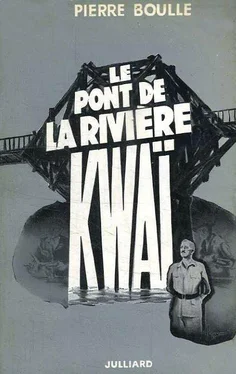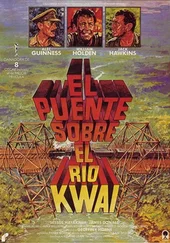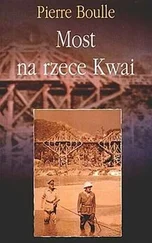In accordance with Joyce’s plan, which, after countless modifications, had been finally adopted by all three of them and on which Number One had now decided to take action, the Force 316 team had split up. Shears, Joyce, and two Siamese volunteers, accompanied by a few porters, had set off in a single file for a point on the river upstream from the bridge, so as to avoid launching the explosives in the vicinity of the camp. They had gone rather far out of their way, making a wide detour to bypass some native settlements. The four men were to move down to the bridge at night in order to prepare the material. (It would be a gross mistake to think that blowing up a bridge is a simple operation.) Joyce was to remain in hiding on the enemy bank and there wait for the train. Shears was to rejoin Warden and, with him, share the responsibility of covering the withdrawal.
Warden was to remain at the observation post, maintain radio contact, observe what went on around the bridge, and reconnoiter possible positions from which to give Joyce covering fire. The scope of his mission was not strictly limited. Number One had allowed him a certain amount of initiative. He would have to act for the best according to the circumstances.
“If you see any chance of following up with a subsidiary attack,” Shears had told him, “then I won’t try to stop you—provided, of course, that there’s no risk of your being discovered. The principles of Force 316 still hold good. But the bridge is our number one target and on no account must you jeopardize our chances of success in that direction. I’m relying on you to be sensible and at the same time forceful.”
He knew he could rely on Warden to be both sensible and forceful. Whenever there was time, Warden methodically weighed up the consequences of every gesture he made.
After an initial reconnaissance of the skyline Warden decided to place his pocket artillery—two light mortars —right on top of the hill and to man this post during the attack with the two Siamese partisans, so that the wreckage of the train, the troops trying to escape after the explosion, and the soldiers rushing up to help them would all be under constant fire.
This was perfectly in keeping with the implicit instructions contained in Number One’s reference to the principles of Force 316. These principles could be summed up as follows: “Never assume an operation is complete in itself; never be satisfied while there’s still a chance, however slight, of causing the enemy further alarm and despondency.” (The typically Anglo-Saxon “finishing touches” were as much in evidence in this sphere of activity as elsewhere.) Now, in this case it was obvious that a hail of mortar shells falling on the survivors, like bolts from the blue, would be calculated to demoralize the enemy completely. The observation post, which commanded the whole valley, was almost miraculously placed from this point of view. At the same time, Warden saw yet another advantage in prolonging the attack: it would divert the enemy’s attention and so indirectly help to cover Joyce’s withdrawal.
Warden spent a long time creeping through the ferns and wild rhododendrons before finding gun emplacements entirely to his satisfaction. When he did find them, he called up the Siamese, chose two of them, and told them exactly what they would have to do when the time came. They were quick in the uptake and seemed to like the idea.
It was about four in the afternoon by the time Warden completed his preparations. He then started to think about the subsequent arrangements to be made, when he heard the sound of music in the valley. He returned to his observation, his field glasses trained on foe and friend alike. The bridge was deserted, but there was something strange going on in the camp, over on the far side of the river. Warden at once realized that, in order to celebrate the successful conclusion of their labors, the prisoners had been allowed, or perhaps even obliged, to throw a party. A signal received a few days ago had notified him of these festivities, decreed by the loving kindness of His Imperial Majesty.
The music emanated from some instrument which must have been knocked together by a local craftsman, but the hand plucking the strings belonged to a European. Warden knew the barbaric tunes of the Japanese well enough not to be mistaken. Besides, the sound of singing soon reached his ears. In feeble, faltering tones, but with an unmistakable accent, a voice was singing an old Scottish ballad. The words echoed round the valley and were taken up in chorus. This pathetic concert heard in the solitude of his observation post moved Warden to the point of tears. He made a conscious effort to repel these gloomy thoughts and managed to drive them out of his mind by concentrating instead on the requirements of his mission. He lost all interest in what was happening inside the camp, except in so far as it affected the impending attack.
Shortly before sundown it looked as if a banquet was being prepared. Prisoners began to crowd around the cookhouse. There was a noticeable stir in the direction of the Japanese quarters as well, where several soldiers were rushing about, shouting and laughing. The Japanese, it appeared, were also preparing to celebrate the conclusion of their labors.
Warden’s mind worked fast. His cool, calculating temperament did not prevent him from pouncing on the first opportunity that occurred. He made the necessary arrangements for going into action that very night, having suddenly decided to follow a plan he had thought of long before he reached the observation post. His profound understanding of human nature told him that in a God-forsaken patch of jungle like this, with a chronic alcoholic like Saito in command, and with soldiers subject to a regime almost as ruthless as that of the prisoners themselves, every Jap in the place was bound to be blind drunk by midnight. Here was an exceptionally favorable opportunity for him to take individual action with a minimum of risk, in accordance with Number One’s instructions, and to lay a few of those subsidiary traps which give to the main attack that additional zest to which every member of Force 316 is partial. Warden weighed up the pros and cons, came to the conclusion that it would be criminal not to exploit this miraculous coincidence, decided to move down to the river, and started making up a small charge… for, even against his better judgment, why should not he, too, just for once, have a close view of that bridge?
He reached the foot of the hill shortly before midnight. The party had ended exactly as he expected it would. He had been able to follow each stage of it from the increasing din punctuating his own silent progress: savage yells, like a parody of the English singing, had stopped some time ago. The silence was now complete. He called a final halt and listened carefully, crouching with two partisans who had accompanied him behind the last curtain of trees not far from the railway line, which at this point ran along the river after crossing the bridge, just as Joyce had described it. Warden signaled to the Siamese. Carrying the sabotage material, the three men cautiously moved off in the direction of the railway.
Warden was convinced he could perform the operation in complete security. There was no sign of the enemy on this bank. The Japanese had enjoyed such complete peace in this out-of-the-way corner that they had lost all sense of danger. By now all the soldiers, and all the officers too, must have passed out, all of them blind drunk. But just to make sure, Warden posted one of the Siamese as a sentry, then methodically got down to work, assisted by the other.
What he had in mind was a straightforward, textbook operation. It was the first lesson taught in the Plastic and Destructions Company’s special school in Calcutta.
Читать дальше











